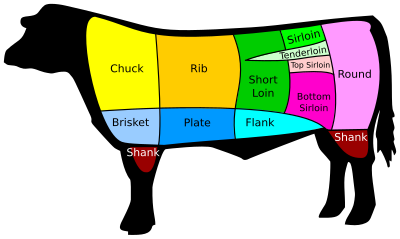A beefsteak, often called just steak, is a flat cut of beef with parallel faces, usually cut perpendicular to the muscle fibers. In Australia, beef steak is referred to as just “steak” and can be purchased uncooked in supermarkets, butchers, and some smallgood shops. It is sold cooked as a meal in almost every pub, beef bottom steak, or restaurant specialising in modern Australian food, and is ranked based on the quality and the cut. The combination is known as steak frites.
This is also the case in Argentina. Steaks are often served with classic French sauces. In Indonesia, bistik jawa is a beefsteak dish that is influenced by Dutch cuisine. Another Indonesian beefsteak is selat solo with Dutch-influence, a specialty of Surakarta, Central Java.
In Italy, steak was not widely eaten until after World War II because the relatively rugged countryside does not readily accommodate the space and resource demands of large herds of cattle. From the 1960s onward, economic gains allowed more Italians to afford a red-meat diet. The dish is usually served in tortillas as a taco. It can be found across Latin America. In the Philippines, bistek Tagalog, a specialty of the Tagalog provinces, is typically made with strips of sirloin beef and onions slowly cooked in soy sauce and calamansi juice. Other vegetables such as peas or a green salad can also be served. Various types of mustard are sometimes offered as a condiment.
In the United States, a restaurant that specializes in beef steaks is a steakhouse. The more expensive steakhouses serve the highest grades of beef and often dry-age it for many weeks. The well-aged beef cooked on high-heat grills and broilers produces a steak difficult to emulate in a home kitchen. Steak is sometimes served with shrimp or lobster tail, giving “surf and turf” or “reef and beef”. Prepared condiments known as steak sauces are generally on the table in steakhouses.
A vocabulary has evolved to describe the degree to which a steak is cooked. Used in dishes like steak tartare, carpaccio, gored gored, tiger meat and kitfo. The steak will be red on the inside and barely warmed. In the United States, this is also sometimes referred to as “black and blue” or “Pittsburgh rare”. The outside is grey-brown, and the middle of the steak is fully red and slightly warm. The steak will have a reddish-pink center. This is the standard degree of cooking at most steakhouses, unless specified otherwise.

The middle of the steak is hot and fully pink surrounding the center. The meat is lightly pink surrounding the center. The meat is grey-brown in the center and slightly charred. In parts of England this is known as “German style”. The meat is blackened throughout and slightly crispy.
A style exists in some parts of North America called “Chicago”. A Chicago-style steak is cooked to the desired level and then quickly charred. A steak ordered “Pittsburgh rare” is rare or very rare on the inside and charred on the outside. 7-bone roast or 7-bone steak From the chuck section of the steer or heifer and it includes a cross cut of the shoulder blade.
The bone is shaped like a “7”, which gives the steak its name. Blade steak Comes from the chuck section of a steer or heifer. Beef tips or steak tips Small cuts of high or medium quality beef left over from preparing or trimming steaks, grilled and served in a manner similar to the cuts they were taken from. Bistek Tagalog: strips of sirloin beef slowly cooked in soy sauce, calamansi juice, and onions. Filipino Fried Steak – Bistek Tagalog Recipe. Archived April 12, 2014, at the Wayback Machine. Archived from the original on 1 May 2012.
Tomahawk Steak – what’s all the fuss? Rich Tramonto, Mary Goodbody, Steak Friends, p. Please help improve it or discuss these issues on the talk page. This article needs additional citations for verification. Please help improve this article by adding citations to reliable sources. This article is in list format but may read better as prose. You can help by converting this article, if appropriate.
